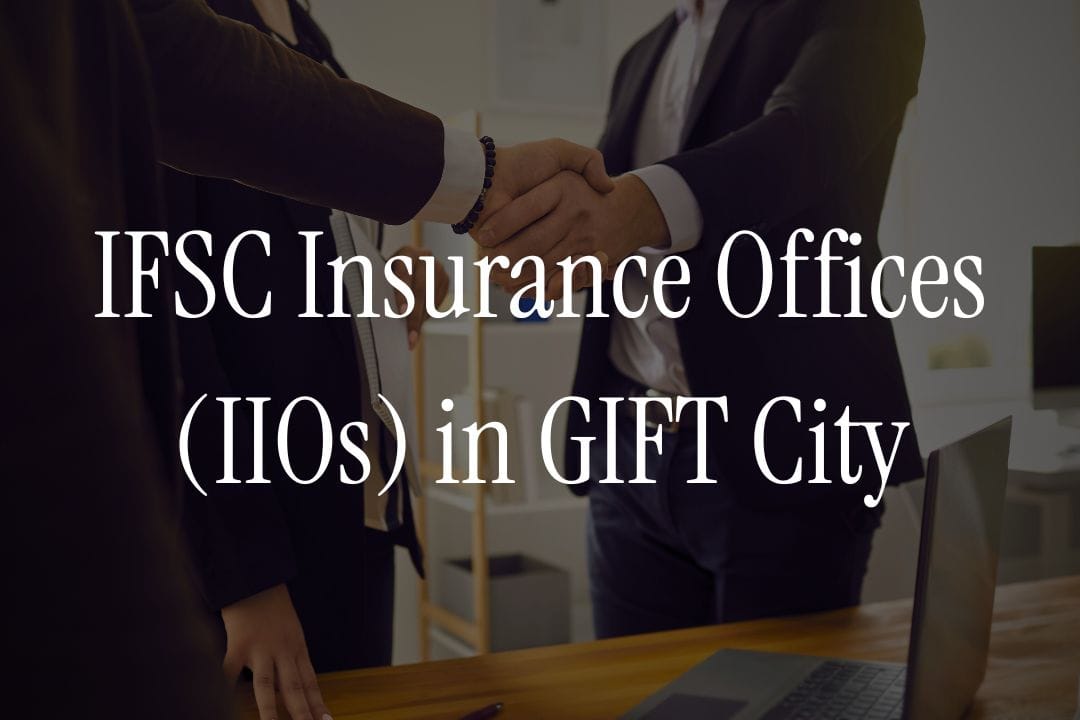IFSC Insurance Offices In GIFT City: Types and NRI Benefits
Global Indians now have an insurance heaven in India - GIFT City. This Special Economic Zone in the heart of Gujarat is an upcoming international financial hub. With the insurance sector predicted to grow to 15x its current volume by 2030, GIFT City offers a myriad of advantages to both NRIs and IFSC Insurance Offices (IIOs), like tax benefits and efficient regulations, making it a very attractive option for insurance players and investors alike. GIFT City currently permits 4 types of insurances, including life insurance, general insurance, health insurance and reinsurance.

Regulatory Framework and Types of IFSC Insurance Offices (IIOs) in GIFT City
All insurance entities, including the ones that have a branch office and those that have been directly incorporated in GIFT City, are known as IFSC Insurance Offices or IIOs. At the inception of GIFT City, all these entities were regulated by the IRDAI guidelines; however, in 2021, IFSCA (Registration of Insurance Business) Regulations were introduced, streamlining and replacing the former IRDAI regulations. Prior to 2023, the IRDAI had dictated an order of preference by which Indian insurers had to first offer reinsurance opportunities to domestic reinsurers before seeking coverage from international players like IIOs. However, even this order of preference has been done away with, increasing the competition and efficiency of the reinsurance sector.
Regulatory Obligations of IFSC Insurance Offices (IIOs)
Parameter | IIO as a Branch Office | Directly Incorporated IIO |
Assigned Capital | Minimum of USD 1.5 million | Not applicable |
Net Owned Fund (NOF) | Minimum of INR 1,000 crore | Not applicable |
Paid-up Equity Capital | Not applicable | - INR 100 crore for insurance - INR 200 crore for reinsurance |
Solvency Margin | As stipulated by home country’s regulator | As specified by IFSCA |
Regulatory Jurisdiction | Primarily regulated by home country authority | Fully regulated by IFSCA |
Minimum Personnel Required | 1. Principal Officer 2. Officer in-charge of finance and accounts 3. Officer in-charge of underwriting | 1. Chief Executive Officer 2. Chief Finance Officer 3. Chief Underwriting Officer |
Types of IIOs
1. Branch Office Insurers and Reinsurers
These are existing companies that have set up branch offices in GIFT City. Although they can transact in freely convertible foreign currencies, these entities can only conduct business as per regulations in their home country.
2. Direct Insurers
These are companies that have registered in the International Financial Services Centre (IFSC) as IIOs. They are free to offer insurance to IFSC clients, those from other SEZ’s and clients outside India but not resident Indians.
3. Direct Reinsurers
These are again reinsurance entities that have been registered in the International Financial Services Centre (IFSC) as IIOs. They can underwrite reinsurance risks from insurers operating within the IFSC, global cedants and Indian insurers as well.
Why NRIs Should Consider Insurance Products from GIFT City
- Non-INR currencies - All insurance and reinsurance companies operating out of GIFT City have the operational advantage of transacting in global currencies. This allows all Indian insurance companies with a branch office in GIFT City to access global customers directly.
- Regulatory efficiency - GIFT City has streamlined all regulatory procedures. The IFSCA, which is the regulatory authority, has put out its own guidelines for insurance and reinsurance companies replacing the former IRDAI rules. From setting up shop to compliance and decision-making, all processes have been simplified.
- Tax advantage - An attractive financial incentive for all companies setting up in GIFT City is the 10 year tax holiday. They are exempt from 100% corporate tax for 10 consecutive years out of the first 15 years of operation. They are also not liable to pay GST or dividend distribution tax unless they opt for the old tax regime. This benefit directly implies reduced costs and higher profits for the IIO.
Tax benefits for NRIs on Insurance in GIFT City

The FY 2025 budget introduced a major tax incentive for NRIs - all ULIPs and endowment plans issued by insurance offices in GIFT City have been made completely tax-free as long as the annual premium is less than 10% of the total sum assured.
Prior to this ULIPs and endowment plans were only tax free if annual premiums did not exceed 2.5 lakhs and 5 lakhs respectively. However, this has been done away with, permitting annual premiums above this limit as well to qualify for the tax benefit.
This creates a significant advantage over other investment routes like Indian equity mutual funds, where NRIs are taxed at 12.5% on long-term capital gains and 20% on short-term gains. To enable NRIs to take advantage of this rule, many insurers in GIFT City have restructured their policies.
The change brings India on par with global financial centres like Dubai and Singapore, where such tax-free insurance products are already available to NRIs. However, this benefit is exclusive to non-residents. Resident Indians investing through GIFT City under the Liberalised Remittance Scheme (LRS) remain subject to domestic tax rules, that is the ULIPs are still taxed if the annual premium exceeds ₹2.5 lakh.
Still confused about what’s legally allowed for your NRI status?
Take our quick NRI Compliance Pass check to ensure you're on the right side of Indian laws.
GIFT City Insurance vs. Traditional Indian Insurance Options
Feature | GIFT City | Traditional Indian Market |
Currency | USD, EUR, etc. | INR |
Regulatory authority | IFSCA | IRDAI |
Tax on ULIP | 0% if annual premium is less than 10% total sum sum assured | Taxed if annual premium is more than ₹2.5 lakh |
Access | Global clients and SEZ clients | Mostly domestic clients |
For NRIs, GIFT City is shaping up to be more than just a financial zone — it’s a strategic gateway to access global insurance products. With tax breaks, regulatory clarity, and the ability to transact in foreign currencies, it’s no surprise that insurers are setting up shop and tailoring products just for global Indians. The insurance boom here is only beginning — and now’s a good time to pay attention.
Also Read:

Comments
Your comment has been submitted